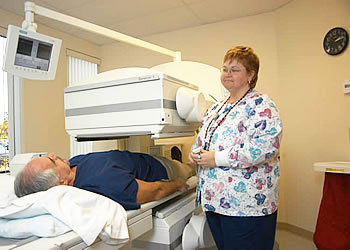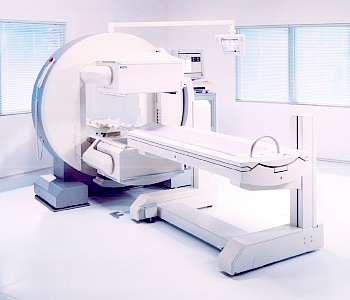About Nuclear Medicine
We provide the following services in our Nuclear Medicine Department:

- Renal Scans
- Renal Blood Flow with Function
- Renal with Lasix
- Renal with Captopril
- Bone Scans
- HIDA with CCK
- Liver/Spleen Scan
- MUGA Scan or Gated Ventriculogram
- Liver Hemangioma Scans
Technology
The Nuclear Medicine department at ImageCare is proud to offer imaging on a Siemens dual head gamma camera, also known as an e-cam. Our nuclear stress images are gated to look at wall motion and check left ventricle ejection fractions.
This machine is also accredited by the ACR (American College of Radiology).

Patient Forms
For your convenience you are now able to view and print pertinent forms online to have ready when you come in for your appointment. The forms below are in .PDF format.
Nuclear Medicine Forms
Patient Preparation
Preparing for Your Nuclear Medicine Exam
There are different preparations involved with each nuclear medicine study. Please refer to the exam you are having to look up the correct prep for your study. Please let us know if you are pregnant or breast feeding.
Bone Scan/3 Phase Bone Scan
- Drink 16 ounces of water 1 hour prior to exam (you MAY go to the bathroom)
- You will come in and receive an injection. You will then be given a return time by the technologist to come back and have your scan taken. This will be 3-4 hours after your injection. Imaging will take 35 minutes to 1 hour.
Renal Scan
- Drink 16 ounces of water 1 hour prior to exam (you MAY go to the bathroom)
- Renal scan takes 1-2 hours to complete
- If having a Renal scan with Captopril do not take any ACE inhibitor medications for 5 days prior
HIDA Scan with CCK
- No barium contrast studies 7 days prior to exam
- Nothing to eat or drink 6 hours prior to exam
- No medications 6 hours prior to exam
- Exam will take 2-4 hours to complete
MUGA Scan
- No preparation
- Exam will take 1-2 hours to complete
Conventional Exercise Stress Test
- No food or drink 1 hour prior to exam.
- Wear loose, comfortable clothing and sneakers.
- No body powder or lotions on your skin, deodorant is fine.
- No caffeinated, decaffeinated, carbonated beverages, or chocolate in any form after midnight.
- Check with department for which medications to hold. The cardiologist performing the stress test will dictate which medications are to be held.
Nuclear Medicine Stress Test
- No food or drink after midnight. You may take your allowed morning medications with small sips of water
- No caffeinated, decaffeinated, or carbonated beverages or chocolate in any form starting from 8am the day prior to your exam.
- Wear loose, comfortable clothing and sneakers
- No body powder or lotions on your skin, deodorant is fine
- Hold all beta blockers, calcium channel blockers, nitrates, and digoxin 24 hours prior to exam, unless told otheriwse
- Exam will take approximately 3 1/2-4 hours. If your exam is scheduled for 2 days you will be here 1 1/2 hours one day and 2 hours the second day.
Frequently Asked Questions
Is it ok to be around children after my exam?
You should not be around babies or small children for the rest of the day because you do have residual radiation from your exam. This is especially important if you are having a nuclear stress test.
What am I injected with?
For all nuclear medicine exams a radioactive material, also known as an isotope or tracer, is injected.
Are there any side effects from the injection?
There are no side effects or allergic reactions to the radioactive materal. When a patient cannot walk well enough on the treadmill, a medication (vasodilator) is used to simulate exercise by dilating blood vessels.
Common side effects:
- headache
- flushed feeling
The cardiologist can give an “anecdotal” medication if needed.
How long will I be on the treadmill?
There is not a set time limit. You must reach 85% maximum heart rate.
Will I have to run on the treadmill?
Perhaps, but usually a fast walk is enough.
What does the treadmill show?
The cardiologist views your EKG as you are walking to see how your heart responds to physical activity; including your blood pressure and heart rate.
Who reads the results and how do I get them?
A cardiologist interprets the stress test and a nuclear medicine radiologist reads the image scan. You are able to obtain your results from your referring physician within 48-72 hours.
Why do I have to stop caffeine?
Caffeine affects your heart rate and the blood flow to your heart; it can adversely affect the image.
Are decaffeinated beverages allowed?
No. Decaffeinated beverages are not caffeine free. Various brands have different levels of caffeine, so they are not allowed.
How long does the injection stay in my system?
The nuclear imaging agent is out of your system within 60 hours, but it is always decaying so it becomes minimal in a relatively short period of time.
What if I cannot walk on the treadmill?
There is a medication called Persantine that will be injected into you. This medication simulates exercise by dilating blood vessels to the heart without having to go on the treadmill.
Will I be able to drive after?
Yes.
Will I be able to go to work after?
Yes, you will be able to resume your normal activities after your exam.
Why does the nuclear stress test take so long?
There are three parts to the test, a resting scan, a stress test and a stress scan. There are waiting times between injections and the stress test.

